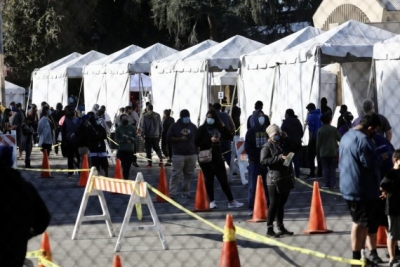US faced 25% increase in food insufficiency during Covid
By IANS | Published: January 12, 2021 11:38 AM2021-01-12T11:38:03+5:302021-01-12T11:55:31+5:30
Toronto, Jan 12 Researchers have found a 25 per cent increase in food insufficiency during the Covid-19 ...

US faced 25% increase in food insufficiency during Covid
Toronto, Jan 12 Researchers have found a 25 per cent increase in food insufficiency during the Covid-19 pandemic, resulting in an increase in depression and anxiety cases in the US.
People of colour were disproportionately affected by both food insufficiency and Covid-19.
Among the nationally representative sample of 63,674 adults in the US, Black and Latino Americans had over twice the risk of food insufficiency compared to White Americans.
"Many of these individuals have experienced job loss and higher rates of poverty during the pandemic," said Jason Nagata from University of California, San Francisco and lead author on the study published in the published in the American Journal of Preventive Medicine.
Food insufficiency, the most extreme form of food insecurity, occurs when families do not have enough food to eat.
Overall, 65 per cent of Americans reported anxiety symptoms and 52 per cent reported depressive symptoms in the week prior to completing the survey.
Those who did not have enough to eat during that week reported worse mental health, with 89 per cent of food-insufficient Americans reporting anxiety symptoms compared to 63 per cent of food-sufficient Americans.
Similarly, 83 per cent of food-insufficient Americans, compared to 49 per cent of food-sufficient, Americans reported depressive symptoms.
"Hunger, exhaustion, and worrying about not getting enough food to eat may worsen depression and anxiety symptoms," said Nagata.
Researchers found that receipt of free groceries or meals alleviated some of the mental health burden of food insufficiency.
"Policymakers should expand benefits and eligibility for the Supplemental Nutrition Assistance Programme (SNAP) and other programmes to address both food insecurity and mental health," said Kyle Ganson, assistant professor at the University of Toronto, a co-author of the study.
-
( With inputs from IANS )
Disclaimer: This post has been auto-published from an agency feed without any modifications to the text and has not been reviewed by an editor
Open in app